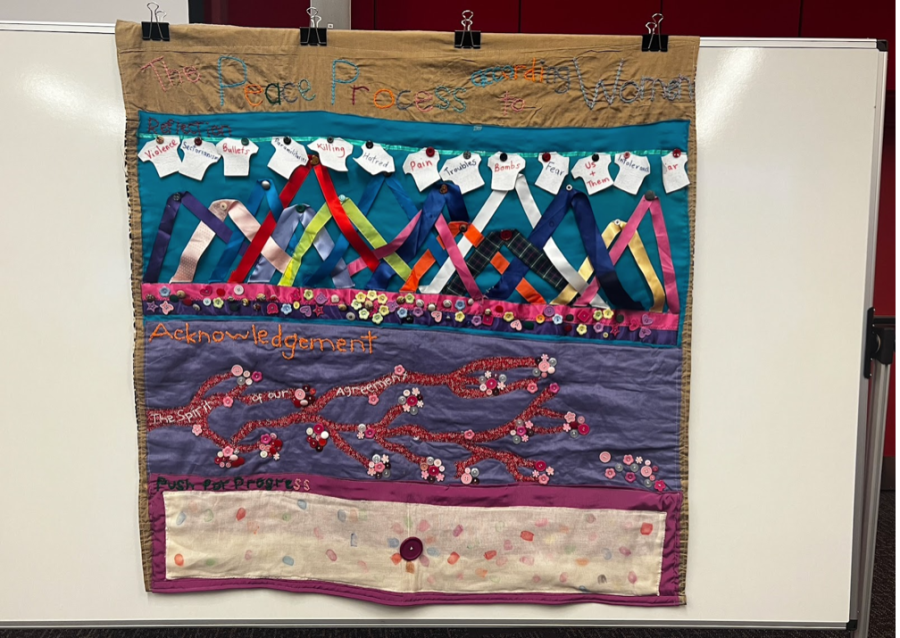On Thursday, March 23, Anne Carr made the journey from Ireland to speak at the University of Massachusetts about her involvement in the Northern Ireland Women’s Coalition.
The coalition was an integral force in securing the Good Friday Agreement. Signed April 10, 1998, the agreement brought a ceasefire to the Troubles, a conflict between Protestant and Catholic communities in Northern Ireland.
Living during the Troubles in Belfast and other parts of Northern Ireland was highly dangerous; Carr is one of many whose life was dramatically affected by the “extended and brutal conflict,” as she described.
“People thought there would never be a way out of the violence we were experiencing,” she said.
When talk of a multi-party peace agreement started, only the top 10 political parties in Northern Ireland at the time would get a voice in the matter.
According to the Northern Ireland Assembly, the Northern Ireland Office denied the request that the parties present a “gender-balanced” list of representatives. And so, the Women’s Coalition was formed.
It was essential that women had a seat at the peace agreement negotiation table — “No more campaigning from the sidelines,” Carr said.
The newly-formed party had to gain a lot of support, very fast. And they did, enabling the first single-issue party in Northern Ireland to get two women at the peace talk table.
The coalition was a cross-community political organization, composed of women from both Protestant and Catholic communities. “The women had been doing the work for years,” Carr said. “Women had been keeping society together for years.”
The other political parties were concerned with the peace agreement being an early arbiter to eventual reunification of Ireland. The Women’s Coalition, however, was focused on reaching a compromise that would foster a peaceful environment for the present generation and those to come, and providing reparations for families and individuals harmed by the violence.
“We had a belief and a fire in our bellies that peaceful change can happen. When women get involved change can happen,” Carr explained.
The women of the coalition had their “fingers on the pulse of communities,” and they were doing peace talks outside of the official peace talk, asking people on each side what they needed from a peace agreement.
“Peacebuilding is always with the art of possibility,” Carr noted. “You can’t be choosy in who you talk to when you are trying to build peace. And that’s difficult.” The women spent years building relationships with community members, talking to businesses and households.
“You don’t need to build peace with your friends, you build peace with your enemies,” Carr wrote via email to the Collegian.
The creation of a peace agreement wouldn’t have been possible without the work the coalition did to build trust within the communities.
“Just maybe we could find a way forward that gave every section of our community enough. That’s what we get from compromise: enough,” Carr added.
April 10, 2023 will be the 25th anniversary of the signing of the Good Friday Agreement.
During the event, Carr recounted that day, which finally took place after two years of negotiations. “I did look around me and so many were silent, and then in tears,” she said. “I remember well the hope in the air.”
She noted, however, that a divided society still exists in Northern Ireland.
“Ending the violence is just the beginning. The hardest work begins as you work to transform contested and traumatized societies and build peaceful relationships,” Carr wrote. “There are fears when tensions are high that we could slip back.”
Many of the clauses the Women’s Coalition proposed did not make it into the final agreement. Despite that reality, Carr said, “What we achieved in the Good Friday Agreement had become a beacon of hope for the world.”
This event was the first of five that will make up the University’s series, “Art of Conflict Transformation.”
As noted by Dr. Leah Wing of the UMass legal studies program, the purpose of this series is to bring “UMass scholars, artists and conflict resolvers to explore the geography of conflict; the spaces in and on which conflict has been imprinted and expressed, and the emerging terrains of resistance, resilience, and transformation.”
Wing has been a long-term friend and colleague of Carr, and with help of junior legal studies major Olivia Martinez-Reynolds, they were able to secure a grant to support Carr’s visit to UMass and her speech.
Martinez-Reynolds said she has always been interested in conflict resolution.
“The fact that [Carr] was here in the flesh was just extra inspiring,” she said. “To feel the passion that she exerted talking about her amazing stories was really rewarding.”
“I think we live in a world where conflict breeds conflict,” Martinez-Reynolds added. “We have so much to learn from the work that [Carr] has done.”
Carr was awarded with a plaque dedicated from the UMass political science department, recognizing her as a peacebuilder for the way she has harnessed community relations; Carr has devoted her life to ending the violence and cultivating a peaceful environment for future generations, who she called “peace babies.”
“They deserve no less,” she said.
“The genuine warmth and support from everyone I met at UMass was wonderful and together we are creating a fairer, more caring and just world. Together, all of us. Always.”
Grace Lee can be reached at [email protected].




















